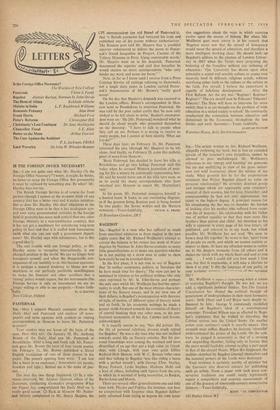Is the Foreign Office Necessary?
The Warden of New College Pasternak Victor S. Frank Bagehot Alastair Buchan, Norman St. John-Stevas The Horn of Africa Kebbede A bbebe Malaise in India L. F. Rushbrook Williams Romantic Pedantry Alan Dent Frank Harris Michael Foot Peter's Reforms Christopher Hill Christianity's Lost Continent Dr. Jane Meiklejohn Chancellor Fiscal J. E. Allen Butter on the Menu Arthur Fawcett The Case Against the Architect F. L. Jackman, FRIBA Lord Waverley Sir John W. Wheeler-Bennett IS THE FOREIGN OFFICE NECESSARY?
SIR, —I am not quite sure what Mr. Hartley ('Is the Foreign Office Necessary?') wants. It might, he thinks, be better to scrap the Foreign Office. But presumably it must be replaced by something else. By what? Mr. Hartley does not say.
The British Foreign Service is of course far from perfect (though I cannot at the moment think of any country that has a better one) and it makes mistakes. But so does Mr. Hartley. His chief objections to the Foreign Office seem to be that it has inadequate con- trol over some governmental activities in the foreign field (it probably has more such control than any other Foreign Ministry in a non-totalitarian country), that it has not ,got a machinery for considering long-term policy (it has) and that it is staffed with bureaucrats (with what else can one staff a government depart- ment? Mr. Hartley says with adventurers, but is this a good idea?).
The real trouble with our foreign policy, as Mr. Hartley seems to recognise intermittently, is our changed position in the world. We can no longer boss foreigners around, and when the disagreeable con- sequences of our inability to do this become apparent, it is perhaps a natural tendency to blame not our weakness, or our perfectly justifiable unwillingness to make the financial and other sacrifices that a `strong' policy would require, but the instruments (the Foreign Service is only an instrument) we are no .longer willing or able to use properly.—Yours faith-


































 Previous page
Previous page